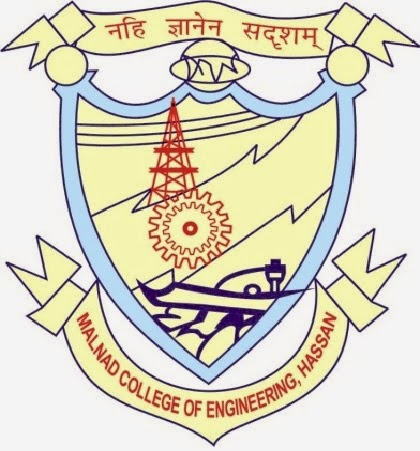VISION, MISSION, PROGRAM EDUCATIONAL OBJECTIVES, PROGRAM OUTCOMES, PROGRAM SPECIFIC OUTCOMES
MALNAD COLLEGE OF ENGINEERING, HASSAN
VISION
To be an Institute of
Excellence in Engineering Education and Research, producing socially responsible Professionals
MISSION
1. Create
conducive environment for learning and research
2. Establish
industry and academia collaborations
3. Ensure
professional and ethical values in all institutional endeavors
VISION
The department will be a centre of excellence for Electronics
and Instrumentation studies driven by research, in association with industry
and society.
MISSION
1. To augment infrastructure in emerging technologies
2. To provide student centered environment for effective learning by giving
hands-on experience
3. To develop research culture and create facilities for transforming idea
into products to cater to society and industrial needs.
4. To collaborate with industry, academia and research organizations for
contribution to the higher order learning and research
5. To prepare students to meet the challenges of dynamic industrial requirements
and higher education
PROGRAM EDUCATIONAL
OBJECTIVES (PEOs)
The Students are Expected to Possess:
1. Capacity to undertake automation jobs having competency in design of
controllers, installation and commissioning of process plants in coordination
with interrelated domain team
2. Required skills to Operate and maintain industrial instrumentation systems.
2. Required skills to Operate and maintain industrial instrumentation systems.
3 3. Acumen to pursue higher education in interrelated domains
of instrumentation.
4. Ability to Design and Implement projects relevant to
industry and community taking into account social, ethical and environmental
considerations.
5.
Knowledge of computational platforms and software
applications related to domain needs.
PROGRAM
OUTCOMES (POs)
Engineering Graduates will be able to:
1. Engineering knowledge: Apply the knowledge of
mathematics, science, engineering fundamentals, and an engineering specialization to the solution of complex engineering problems.
2. Problem analysis: Identify, formulate, review research literature, and analyze complex engineering problems reaching
substantiated conclusions using first principles
of mathematics, natural sciences, and engineering sciences.
3. Design/development of solutions: Design solutions for
complex engineering problems and design system components or
processes that meet the specified needs with appropriate consideration for the public health and safety, and the cultural, societal, and environmental considerations.
4. Conduct investigations of complex problems: Use research-based knowledge and research methods including design of experiments, analysis and interpretation of data, and synthesis of the information to provide valid conclusions.
5. Modern tool usage: Create, select, and apply appropriate techniques, resources, and modern engineering and IT tools including prediction and modeling to complex engineering activities with an understanding of the limitations.
6. The engineer and
society: Apply reasoning informed by the contextual knowledge to assess societal, health, safety, legal and cultural issues and the consequent responsibilities relevant to the professional engineering practice.
7. Environment and sustainability: Understand the impact of the professional engineering solutions in societal and environmental contexts, and demonstrate the
knowledge
of,
and need for sustainable development.
8. Ethics: Apply ethical principles and commit to professional ethics and responsibilities and norms of the engineering practice.
9. Individual and team work: Function effectively as an individual, and as a member or leader in diverse teams, and in multidisciplinary settings.
10. Communication: Communicate effectively on complex engineering activities with the engineering community and with society at large, such as, being able to comprehend and write effective reports and design documentation, make effective presentations, and give and receive clear instructions.
11. Project management and
finance: Demonstrate knowledge and understanding of the engineering and management principles and apply these to one’s own work, as a member and leader in a team, to manage projects and in multidisciplinary environments.
12. Life-long learning: Recognize the need for, and have the preparation and ability to engage in independent and life-long learning in the broadest context of technological change.
PROGRAM SPECIFIC OUTCOMES
PSO1: Adopt
concepts of measurement and transduction for instrumentation.
PSO2: Employ
knowledge of instrumentation for process automation.


Comments
Post a Comment